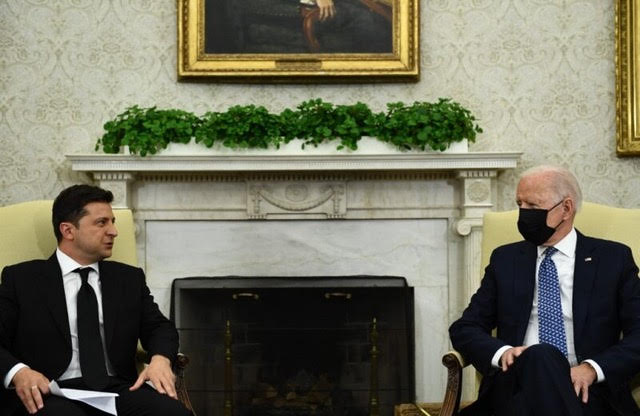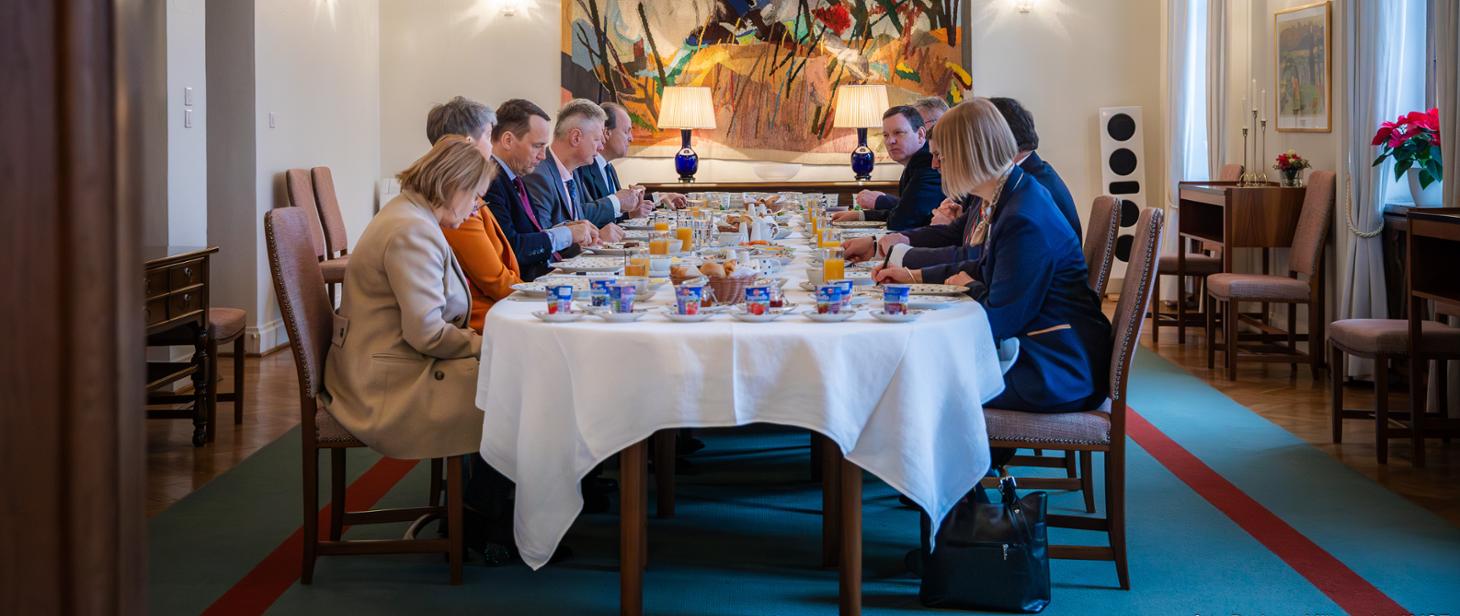
Kyiv Airing Disappointment With Western Policies
Kyiv Airing Disappointment With Western Policies
Ukrainian President Volodymyr Zelenskyy is reverting to his earlier, forlorn hopes of improving relation with Russia through a personal meeting with President Vladimir Putin. The Ukrainian president is eager to meet Putin “any time, any place”—whether bilaterally or in the framework of a “Normandy” summit (Russia, Ukraine, Germany, France). The chief of the Ukrainian Presidential Office, Andriy Yermak, is negotiating the conditions for a Zelenskyy-Putin meeting in either of those formats. This track ended badly for Zelenskyy in 2019 (see EDM, October 3, 16, 17, December 5, 2019).
A fresh outreach to the Kremlin looks incongruous with Zelenskyy’s messages during his recent visit to the United States (August 31–September 2) and since. The Ukrainian authorities have flooded the country’s media with images of Zelenskyy’s efforts to advance Ukraine-US relations and the quest for North Atlantic Treaty Organization (NATO) membership. Those efforts are sincere beyond doubt, although they are also calculated to ensure the support of Ukrainian patriotic opinion for Zelenskyy’s reelection. At the same time, Zelenskyy’s strong emphasis on Ukraine’s Western orientation carries its costs for the president and his Servant of the People party in the country’s east and south. A Zelenskyy-Putin meeting—or at least a convincing effort by Zelenskyy to bring it about—could help rebalance that electoral equation.
Such rebalancing may become a political necessity for Zelenskyy if Ukraine’s main Western partners continue to disappoint Kyiv’s aspirations. It is, indeed, the case that Kyiv’s uphill reform efforts are being inadequately recognized or rewarded; its Western “strategic partners” have yet to develop a strategic (as distinct from ad hoc, or piecemeal) approach toward Ukraine; and the level of Western political support for Ukraine has, overall, actually declined in recent months.
The high-profile event known as Yalta European Strategy (YES), just held in Kyiv as a “brainstorming” session, occasioned an unprecedented airing of frustrations by Zelenskyy and other Ukrainian officials (Ukrinform, President.gov.ua, September 13). While admitting to the slow pace of reforms in Ukraine, they feel that Western partners underestimate what has been achieved and the continuing efforts. “What we need is not strategic partners but strategic friends. Let the strategic partners talk about our shortcomings, let the strategic friends close ranks with us,” said Zelenskyy, apparently alluding to the largely empty Joint Statement on the US-Ukraine Strategic Partnership, released on September 1, during his Washington visit (see EDM, September 7, 9).
Ukrainian officials see NATO de facto closing its door to a country that has built a combat-capable army and holds the line of Europe’s defense vis-à-vis Russia for the last seven years. “Ukraine is knocking at a door that no one intends to open.” “We are not begging. NATO needs us. NATO would be weaker without Ukraine. If you want to strengthen Russia, then do not take Ukraine,” Zelenskyy remarked (Ukrinform, President.gov.ua, September 13).
The US go-ahead to the Russo-German Nord Stream Two natural gas pipeline exposes Ukraine to severe risks. As Yermak noted during the YES forum, Russia is already using this project as an energy weapon against Ukraine (withholding transit) and in Europe (driving up prices to unprecedented levels). According to Yermak, political statements from Washington and Berlin that they would react to Russian political misuse of this pipeline are not reassuring. The Ukrainian president and government have asked for official commitments in writing, but Washington and Berlin have yet to respond (Interfax-Ukraine, September 13).
In an unprecedented public confession, Foreign Minister Dmytro Kuleba said that “this country [Ukraine] has learned from a number of bitter lessons that Western promises are likely [to remain] unfulfilled. We do not believe in promises. […] Army, diplomacy and the Ukrainian people—this is what we have to survive” (The Independent, September 13).
The current year (thus far) seems particularly rich in the kind of lessons to which Kuleba alluded. The Joseph Biden administration became the source of the most serious disappointments. Following a policy review, one stage of which seems to have been concluded in April, the administration greenlighted the Nord Stream Two pipeline in May by waving the Congressionally mandated sanctions on Russian Gazprom. This decision reversed the Donald Trump administration’s policy that opposed the project’s completion. The Biden administration also withdrew support from a Ukraine-NATO Membership Action Plan (MAP), also in May; and it went on in June to introduce previously non-existent criteria for Ukraine to qualify for a MAP. The administration has yet to nominate an ambassador to Ukraine or a special negotiator on the Russia-Ukraine conflict; both positions have been vacant for two years now (see EDM, May 6, 10, 27, June 1, 17). The Biden administration’s one important positive message is the abandonment of the Russian-imposed Minsk “agreements” regarding the war in Ukraine’s east. The Joint Statement on the US-Ukraine Strategic Partnership, while poor in practical deliverables, nevertheless holds the prospect of reinvigorating that partnership when the Joint Commission meets again (see EDM, September 7, 9).
German policy is also frustrating to Ukraine though hardly disappointing; Berlin’s policy continued on its long-established track. When Green Party co-chair Robert Habeck attempted, in June, to stray from that track, proposing that Germany authorize sales of defensive military equipment to Ukraine, all German parliamentary parties (including Habeck’s Greens) issued statements against that proposal, as did the government. This stance also signifies closing NATO’s door to Ukraine de facto. On her farewell visit to Kyiv, Chancellor Angela Merkel asked Ukraine to transpose the “Steinmeier Formula” into Ukraine’s legislation, notwithstanding that it is incompatible with Ukrainian sovereignty and that Merkel had not previously made a political investment in Steinmeier’s idea (Ukrinform, August 22).
The accumulated frustrations may prompt Zelenskyy and Yermak to hedge their bet on the West and go ahead with their outreach to the Kremlin (see above).


